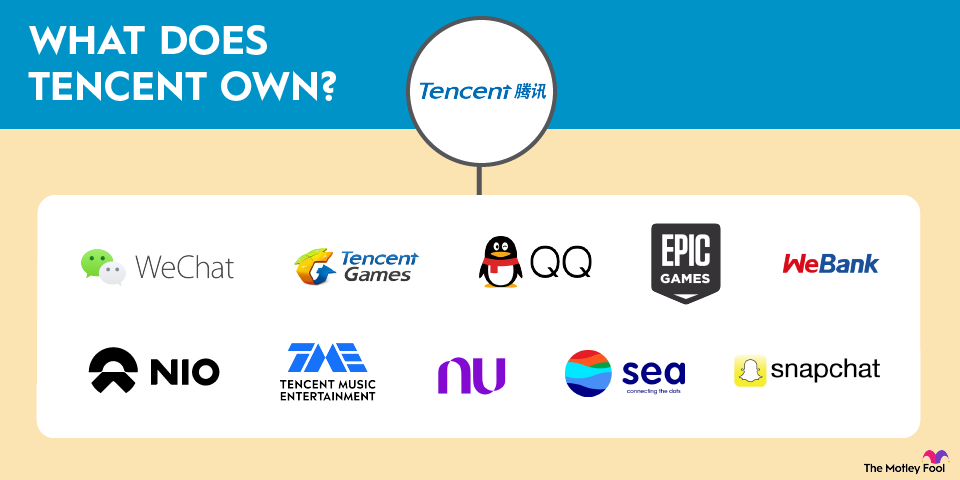Tencent (TCEHY +1.92%) is one of the world's leading internet and technology companies. The Chinese company operates some of the most widely used communications tools in the world and publishes some of the most popular video games. Tencent also has cloud computing, advertising, and financial technology businesses, among others. On top of all that, it has a large investment portfolio.
More than 1 billion people use Tencent's social media apps each month. They empower users to communicate, share videos, make payments, and shop. However, social media is only part of Tencent's global technology empire.
Here's a closer look at Tencent's massive technology and investment operations, as well as what companies it might seek to acquire in the future, so you can decide if investing in Tencent is a good choice for you.

Epic Games
Tencent made a strategic investment in Epic Games (the developer of Fortnite) in 2012. It holds an estimated 40% stake in the gaming company, which also counts Sony (SONY +4.50%), Disney (DIS +3.24%), and Lego Company owner Kirkbi A/S among its minority shareholders.
Tencent's investment helped Epic fund its growth. In addition to producing popular games, Epic developed the Unreal Engine, a leading game engine technology used by many gaming studios worldwide, including Tencent.
Sea Limited
Tencent is the largest shareholder of Singapore-based consumer internet company Sea Limited (SE -0.55%). As of mid-2025, it owned less than 20% of the e-commerce company's outstanding shares (and less than 10% of its voting power). While Tencent trimmed its stake in Sea in 2022 (it sold about 2.5% of its shares worth $3 billion), it plans to retain most of its remaining shares to participate in Sea's long-term success and continue their existing business relationship.
E-commerce
While Tencent primarily targets Asian technology companies, it also invests globally across gaming, fintech, electric vehicles, AI, and digital media, giving it a wide range of potential acquisition targets.
Gaming remains a top priority. Tencent has increased its ownership stakes in several game developers, including a 25% stake in Ubisoft’s new gaming subsidiary in 2025 and a larger position in FromSoftware’s parent company. Given recent underperformance in some of its own game launches, Tencent could become more aggressive in acquiring proven gaming IP or studios. One rumored target has been Dungeons & Dragons, owned by Hasbro (NYSE:HAS), through Tencent-backed developer Larian.
Beyond gaming, Tencent continues to expand its music and media footprint. In 2024, Tencent and Tencent Music acquired a 10% stake in Thailand’s GMM Music, and in 2025 Tencent Music reportedly explored acquiring Chinese audio platform Ximalaya. Additional investments in music and content platforms would be a natural extension of this strategy.
Tencent is also pouring capital into business technology. The company has committed roughly $70 billion to cloud computing, artificial intelligence (AI), and blockchain, backing AI startups such as Enflame and Zhipu. As it builds out its Hunyuan AI model and monetizes AI-powered advertising tools, further investments in AI startups are likely.
Finally, Tencent has been steadily diversifying into new sectors, including healthcare. Investments in companies like stem cell therapy developer Bioon suggest healthcare could become a longer-term growth pillar, especially as China’s population ages.
The bottom line
Tencent is one of China's largest technology companies. Its popular Weixen/WeChat super app has turned it into a social media and payments powerhouse. It's also a leading gaming developer.
The company has reinvested the profits from those businesses into many other companies, turning it into a diversified conglomerate and holding company. Tencent will likely continue to acquire and invest in more companies, most likely in the gaming, AI, and healthcare sectors. Its broad focus makes Tencent a potentially compelling stock to buy and hold for those seeking to invest in faster-growing industries with a geographical focus on Asia.



























